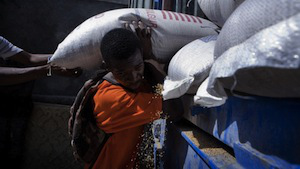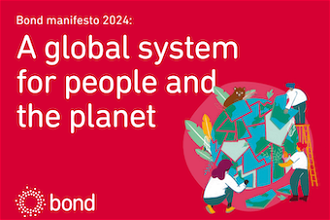Independent audit slams UK overseas aid links with business

image Caritas Haiti
The Independent Commission for Aid Impact (ICAI) has today released an audit of how the Department for International Development (DfID) works through and with business. DfID's business partnerships programme was given an overall 'amber-red' rating - meaning that it was performing "relatively poorly against ICAI's criteria for effectiveness and value for money."
The same 'amber-red' rating was also given to the objectives, delivery, impact and learning assessments of the programme. The commission wrote that it was "concerned about the level of strategic oversight DFID has over business engagement activities and the lack of clear targets for this portfolio. Our findings show that DFID needs to do more to translate its high level ambition into detailed operational plans with a clear focus on poverty reduction." The commission also identified cases where it was "not confident that DFID's support is additional to what businesses would have done anyway, especially in the case of challenge funds."
Responding to the report Ben Jackson, Chief Executive of Bond, the membership body for international development NGOs, said: "We welcome the attention the ICAI report brings to this increasingly important area and in particular the pressing need to prioritise a focus on the poor. We are concerned about the report's finding that so far DFID's work on business growth and investment cannot be shown to benefit poor people - a serious challenge given the share of the aid budget directed towards private sector investment.
There is also limited evidence that DFID support to businesses is actually additional to what those businesses would have done anyway. Channelling precious aid into enterprises who potentially don't really need it - rather than into priority essential services such as health and education - runs the risk of experimenting on the backs of the poor."
Alison Griffiths of Practical Action, Chair of the Bond Private Sector Group, said: "The report concludes that 'the link between business engagement and reducing poverty is not always clear'. NGOs have been raising concerns with DFID for a couple of years about whether and how those in poverty will benefit from their new strategic focus and the increased spend on private sector development. We call on DFID specifically to promote inclusion of the people in the poorest parts of the world by looking at a broad spectrum of the private sector, particularly micro businesses and those operating in the informal sector, who provide opportunities or goods and services to strengthen livelihoods.
We also stress that private sector development will only be inclusive and truly beneficial if environmental sustainability is also prioritised i.e. operate within planetary boundaries and promote both the sustainable use of natural resources, and climate protection."
Beck Wallace, a private sector policy analyst at the CAFOD, said: "DfID needs a clear oversight mechanism in place when working with private firms that goes beyond just cash flow and considers who bears which of the economic, social and environmental costs, risks and benefits of projects. By identifying specifically what value it adds to partnerships with private firms, DfID can help drive forward thinking about how best to deliver poverty reduction through profit-making enterprises."
Polly Jones, head of campaigns and policy at Global Justice Now said: "This damning report shows that there's almost no evidence for the effectiveness of DfID's business partnerships in alleviating poverty and in some cases nothing to suggest that aid money has enabled additional activities to what businesses would have done anyway. Despite the fact that £494 million of taxpayers' money has been spent on these schemes over the course of two years, the audit highlights an astounding lack of strategic oversight. DfiD's approach seems to be driven by an outdated ideological commitment to free-market mania.
You're left with the impression that aid money has been spent on aiding the efforts of corporations to expand their markets in the global south rather than to support economically marginalised communities to access to basic amenities."Global Justice Now has raised numerous concerns and criticisms of DfID's increasing involvement with the private sector - a policy that was ramped up over the course of the previous government.back New Alliance for Food Security was fuelling the 'corporate scramble for Africa."
Read the report here: http://icai.independent.gov.uk/wp-content/uploads/2015/05/ICAI-Business-in-Development-FINAL.pdf
See also:
Global Justice www.globaljustice.org.uk/
Bond www.bond.org.uk
CAFOD: www.cafod.org.uk


















